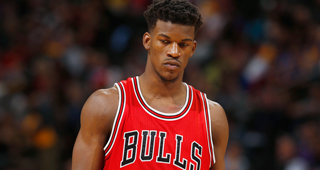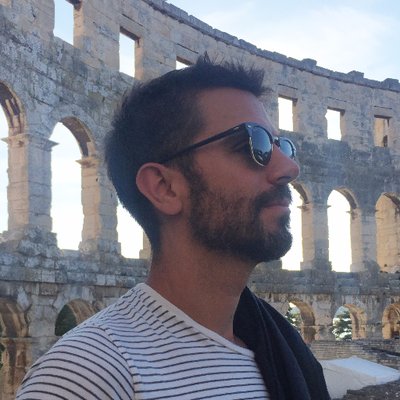Despite having one of the best young cores in the NBA, you knew from the moment Tom Thibodeau was hired by the Minnesota Timberwolves that he would be on a more accelerated timeline than most franchises would follow. After attempting to trade for Jimmy Butler last June, the Wolves were successful the second time around with a similar trade offer.
Butler is coming off a career season, posting a True Shooting Percentage of .586 with an assist rate of 24.8 while playing under less than ideal floor spacing circumstances with Dwyane Wade and Rajon Rondo. The fit with Karl-Anthony Towns will be excellent, but there could be some adaptation complications with Andrew Wiggins. While Wiggins has been a productive player in the NBA, he’s been so in a different way than many expected. Wiggins has been more of a ball dominant scorer rather than the all-around, two-way player that his physical profile projected him to be when he was the No. 1 overall pick in 2014. The Wolves now hope Butler can influence Wiggins and shift him down in the pecking order where he emerges in his fourth NBA season the way Butler did for the Bulls.
The Wolves instantly have the title contention formula by giving Towns and Wiggins one of the NBA’s top-15 players right now. Towns has MVP potential and that growth should accelerate playing beside someone like Butler. Other than Kawhi Leonard and the Spurs, the Wolves have had the most promising potential in challenging the Warriors due to the unique inside/outside skillset of Towns. But that depended on who they can acquire to build around him and this trade is a more meaningful upgrade of talent and potential than anyone could have hoped for.
Butler turns 28 and relies heavily on his athleticism, but the Wolves will get three or four years of Butler’s absolute prime and we’ll see if he can extend into more of a role player like Andre Iguodala when Towns and Wiggins hit their peak powers.
Grade for Wolves: A
The Bulls stay true to their ideologies by not trading Butler for a combination of future draft picks, instead trading for a shooting guard coming off a torn ACL who is now extension eligible, and a point guard coming off a disappointing rookie season. The Bulls aren't a franchise that strips things down all the way, at least not since 1998. This is unequivocally one of the worst trades we have seen for a player of Butler’s caliber in recent seasons, particularly when considering he can’t be a free agent until 2019.
The Bulls’ front office has erred in irrationally falling in love with their own young players at various times in the past, and have appeared to make the same mistake in doing so on Minnesota’s young players in Zach LaVine and Kris Dunn. While certainly not without talent, LaVine and Dunn were Minnesota’s least effective players last season in terms of Net Rating. Neither player has All-Star potential and that's what most GMs seek when trading away a perennial All-Star like Butler. They also aren't that young with LaVine at 22 and at 23.
LaVine was becoming a more efficient scorer this past season as a third option, but was a clear liability on defense with sporadic effort.
Trading for Dunn also follows trading for Cameron Payne at the deadline, who couldn’t get on the floor for the Bulls, and is a step away from being out of the league altogether. Dunn can become a great defensive player at the point of attack, but the likelihood of ever being a starting caliber point guard on the offensive end is unlikely. Dunn can’t shoot and is unlikely to develop that part of his game, and he’s also very limited off the dribble.
The final piece of the trade was No. 7 where they selected Lauri Markkanen, who makes Nikola Mirotic’s restricted free agency irrelevant. The decision to acquire Dunn also makes picking a more talented option than Markkanen at No. 7 such as Malik Monk or Dennis Smith Jr. even a worse miscalculation. That, plus they gave up No. 16, which became Justin Patton for Minnesota.
The Bulls did create a $15.3 million trade exception in the trade, though that’s unlikely to yield a meaningful asset considering they’re taking an obvious step back.
As unappealing as it may have been to stay the course with Butler as a middling Eastern Conference playoff team, the Bulls set their future back even further by not beginning their rebuild correctly by getting more. Boston reportedly declined to offer their No. 3 pick or Brooklyn's pick next season; if that was the case, they were better served waiting to see what happens with Gordon Hayward's free agency.
Grade for Bulls: F
From a basketball perspective, Butler has the chance to play with an All-NBA player again in Towns and compete in a Western Conference that has the Warriors at the top but a lot of other teams in flux in the middle. As important to Butler, he’s reuniting with Thibodeau and ending a less than comfortable two seasons with Fred Hoiberg.
Financially, Butler loses a lot of money in being traded by the Bulls. Butler won’t be eligible for a supermax contract the way he was on track to with the Bulls and as a player that came into the NBA at 22, getting that 10-year 35 percent max is a difficult milestone to reach.
Rightly or wrongly, not wanting to pay Butler a 35 percent max contract factored into the Bulls' calculus considering they followed this move with selling their high second rounder for $3.5 million.
Grade for Jimmy Butler: B



